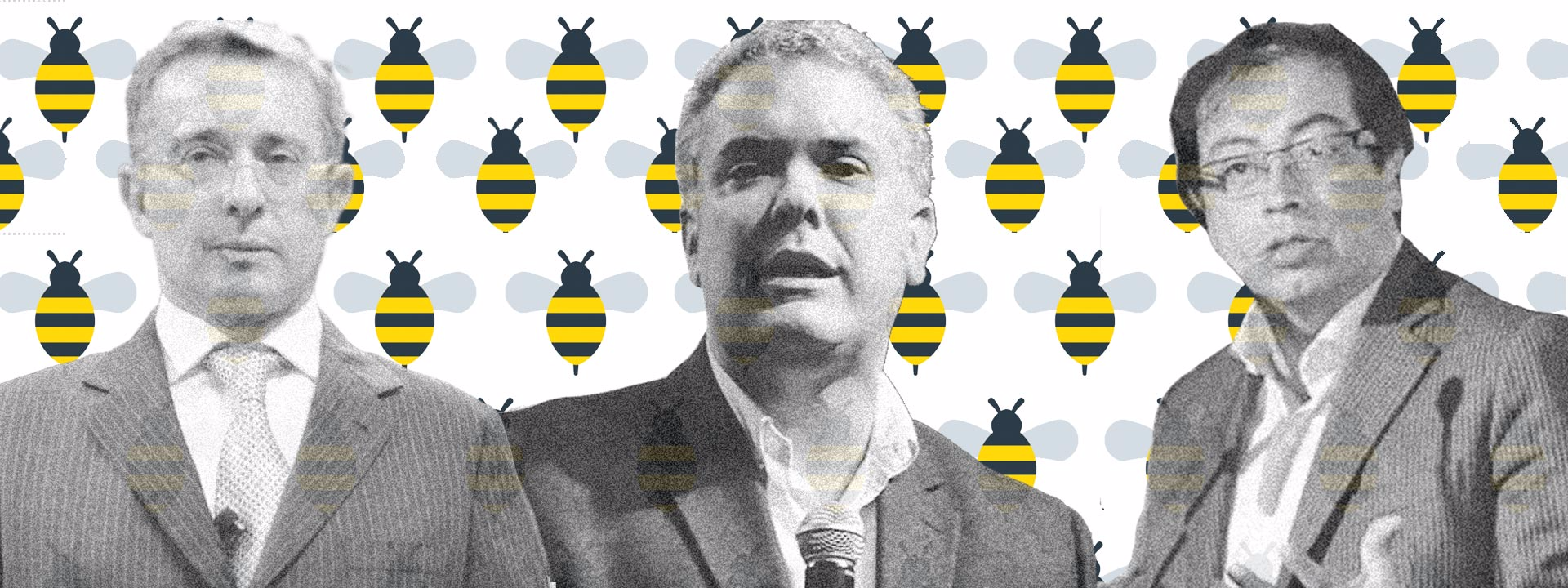#ElectionWatch: Bees Cause Buzz in Colombia
Election rally with a sting as both sides usenews
#ElectionWatch: Bees Cause Buzz in Colombia

Election rally with a sting as both sides use news

The biggest news of the last weekend before the presidential runoff election in Colombia started with an odd tweet by former President Alvaro Uribe, on June 9.

In following tweets, Mr. Uribe explained that, moments before a political meeting he was about to hold in La Loma, a small town in the Cesar department, a swarm of bees attacked the crowd. Several people were hurt, and the event had to be cancelled. The event was a rally for Iván Duque, Centro Democratico’s presidential candidate and Uribe’s protégé, who will face a runoff on Sunday, June 17, against Colombia Humana’s Gustavo Petro.
Africanized bees, or “killer bees”, are a lot more aggressive than regular honey bees. According to this document by Florida University, an Africanized bee swarm can send several hundred bees when they sense a disturbance, instead of the 20 or 40 bees a honey bee would send, which results in up to 10 times more stings to people.
Messaging about the incident quickly turned political. A number of high-profile Uribe sympathizers blamed supporters of Colombia Humana’s Gustavo Petro for the attack.

Bedoya’s reference to “marble” hints at an event last Friday, where two top leaders of Sergio Fajardo’s campaign — the third runner during the first round — joined Petro’s run in exchange for the candidate signing to several commitments in two marble slabs.

At least two other Centro Democratico senators said the incident was a deliberate attack, but they stopped short of naming Petro or his followers explicitly. However, the Police chief of the Cesar department confirmed later that Mr Uribe’s helicopter caused the bees to go after the crowd. Also, Uribe himself said that “I am not able to accuse anyone” of the incident, as Canal Uno reported. None of these accounts reported the more accurate version of events.
Still, the tweets amplified broadly among the Uribe followers’ community on Twitter, as an analysis performed by @DFRLab on Sysomos shows.


Both tweets with direct accusations were mostly shared by other high-profile Uribista accounts. Rodriguez’s most influential retweeter, measured by the number of retweets they generated in turn, was Alvaro Prada, a Chamber Representative from the Centro Democratico party. All the top retweeters are popular Uribe supporters.
Compare this with the spread of Caracol Radio’s report of the Police explanations of the incident.


The top retweeters this time were Hollman Morris, a Bogota council member and longtime Petro ally, along with other popular Petro influencers and political analysts who have announced their support for the left-wing candidate.
The top referrers to the Caracol piece show a similar pattern.

It is worth noting that the patterns of distribution of both tweets with false information, and their correct versions, spread within very different groups. While the former was popular among Duque and Uribe supporters, the latter was mostly shared by Petro-friendly users and groups.
Like the case with the #FraudeElectoral hashtag, partisan users were willing to push deceptive narratives, without regard for the availability of verified versions of them. What is even more worrying, is that the work of fact-checkers and journalists is not being shared widely enough for debunking lies on social media.
This is consistent with some other findings by Colombian researchers. Fabián Hernández, from the Mission of Electoral Observation, recently gave an interview to Centro Gabo and said, “a community who shared a lie is very likely to never have access to the contents where the lie is debunked.”
#AbejasConPetro: Trolling Back
The story of the bees galvanized social media users from all parts of the spectrum. Soon, candidate Gustavo Petro joined the conversation.

After the incident, the hashtag #AbejasConPetro (#BeesWithPetro) began to trend. It started as a joke by a low-follower account, but it caught steam as it was picked up, in a partisan tone, by a pro-Petro influencer:

The tag was mostly used to mobilize Petro supporters, emphasizing the allegedly popular origin of his campaign and the coordinated and massive efforts of his followers.

This narrative had a sizeable spread on Twitter:

In response, Uribe posted a tweet which attempted to turn the joke around, adopting the “bee” metaphor to his own party. This, too, achieved significant impact, with almost 5,000 engagements (tweets + likes).

Conclusion
The incident of the bees was small in itself, but, like bees, it created a buzz online. Initially seized on by Duque’s supporters, it was then adopted by Petro’s partisans, before Uribe attempted to take it back.
In the final week before the election, this incident shows the eagerness with which both sides can seize on any incident which might be turned to political advantage — even if their claims are not backed by the facts.
This is characteristic of pre-election periods in many democracies; it may, however, suggest that Duque’s supporters are not yet confident in victory and keep campaigning, despite their candidate’s strong victory in the first round of voting and current healthy lead in recent polls.
@DFRLab will continue to monitor the situation as voting day approaches.
#ElectionWatch in Latin America is a collaboration between @DFRLab and the Adrienne Arsht Latin America Center at the Atlantic Council.
Follow along for more in-depth analysis from our #DigitalSherlocks.

